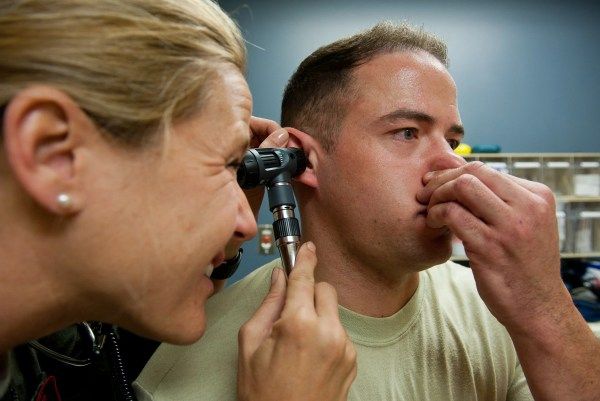What to do when your ears feel blocked on a flight

As the pilot announces it's time to prepare for landing, the plane starts its descent and the pressure in your ears begins to build. If you’re traveling with a baby or toddler, get ready for some painful cries.
After landing, you make your way down the aisle and your ears either pop or remain blocked. Sometimes they won’t pop for hours or even days. What’s happening?
 (Image by Radist/Getty Images)
(Image by Radist/Getty Images)The impact of air travel on our ears
The Eustachian tube, about the size of a cocktail straw, connects the middle ear—which houses the eardrum—to the nasal cavity and throat, as explained by Dr. Ana Kim, an otolaryngologist and neurotologist at ColumbiaDoctors Midtown, and an associate professor at Columbia University Medical Center in New York. This tube plays a crucial role in balancing pressure on either side of the eardrum.
"During flights, especially at takeoff and landing, rapid changes in barometric pressure can cause the Eustachian tubes to collapse, disrupting normal airflow from the nose to the ear," explains Kim. "This collapse hinders airflow and reduces the space around the eardrum."
The popping feeling you experience is a sign that the Eustachian tube is reopening. However, this doesn't always occur right away.
What to do if your ears won't pop
To help open your airway, focus on moving the muscles in your mouth. Start by swallowing or yawning (even a simulated yawn with your mouth wide open), and consider chewing gum or sucking on candy. "By engaging the muscles of your mouth and throat, you can move the eardrum, which is akin to a cellophane material," says Kim. "Moving the eardrum creates additional air space."
The most effective technique is to take a deep breath and forcefully expel the air while pinching your nostrils shut and keeping your mouth closed; this is known as the Valsalva maneuver.
 Valsalva maneuver. (Image by U.S. Air Force Airman 1st Class Kate Thornton/Wikimedia Commons)
Valsalva maneuver. (Image by U.S. Air Force Airman 1st Class Kate Thornton/Wikimedia Commons)These methods may not be suitable for infants or toddlers, but you can help them swallow by breastfeeding or offering a bottle or pacifier. For older toddlers and preschoolers, encourage yawning by demonstrating exaggerated yawns for them to imitate.
When your ears feel blocked, it might be tempting to think that removing excess earwax will solve the issue. However, be cautious—using cotton swabs or similar tools can push the earwax deeper and pack it more tightly.
My ears still won't pop—what should I do now?
Generally, there’s no need to worry, and you can wait to see if the issue resolves itself. "I usually recommend waiting a few days, depending on your discomfort level. If you're experiencing pain or it's affecting your hearing, you should see a doctor immediately," advises Kim. "Your physician can prescribe medications like steroids, which are strong anti-inflammatories, and ensure your hearing is fine." This is crucial, as inflammation can lead to long-term hearing issues, she adds.
Occasionally, the issue may stem from fluid accumulation, often due to a cold or infection rather than the flight itself. If fluid isn’t draining naturally, your doctor can perform a simple in-office procedure to make a small incision and suction the fluid from the middle ear. In some cases, temporary tubes may be inserted for drainage. "The incision typically heals within a day, but to maintain airflow and help dry the fluid, we use temporary tubes to facilitate air movement," Kim explains.
How to prevent future issues
To remind yourself to swallow during takeoff and landing, keep gum or candy handy and consume them as soon as you notice pressure changes. For those traveling with a baby or toddler, provide a bottle or pacifier. Nursing works well for infants and toddlers too. If you prefer not to give small children gum or candy, consider snacks like fruit leather that require extended sucking and swallowing.
Using a long-acting decongestant like Afrin or Sudafed can be beneficial. Begin using it half an hour prior to takeoff or landing.
Be cautious of conditions that may increase your risk of ear-popping issues. "Individuals who frequently suffer from sinus infections may be more vulnerable because inflamed and swollen nasal lining can obstruct airflow," says Kim.
Similarly, having a cold or experiencing nasal congestion from allergies can make you more susceptible: "The ear is a very sensitive indicator of what’s going on in the nose," she explains. In such cases, it's advisable to take a decongestant before flying.
However, the situation changes if there's an ear infection, which, as many mothers are aware, babies and toddlers are especially prone to. "If you or your child has an ear infection, we recommend against flying," Kim advises.
Bottom line
Typically, an ear that doesn’t pop is merely a common travel inconvenience that can be managed with a bit of patience. Have you or your kids experienced this issue after flying? What solutions worked for you? Share your thoughts in the comments.

1

2

3

4

5
Evaluation :
5/5